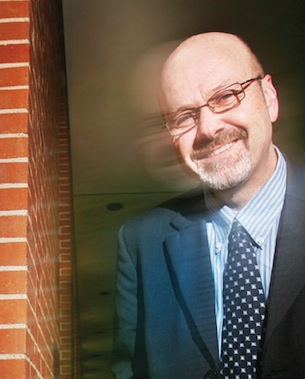By Barbara Elmore
The good news is that top-notch scholars with Ph.D.s in accounting, finance and marketing will discover a healthy job market today and probably for many years to come.
The bad news is that the numbers of people to teach students who want those degrees are disappearing by the hundreds and not being replaced.
Back to the good news: The pulse at Baylor’s Hankamer School of Business remains strong, even though recruiters are seeing increased competition for professionals and finding that some jobs wait for professors longer than they would have in the past.
“We have been fortunate in last two to three years to get great faculty,” says Charles Davis, chair of Accounting & Business Law and the Walter Plumoff Professor of Accounting. “They are finding us and we are finding them.” However, adds Davis, the accounting applicant pool is at an all-time low. And even though the last few years have been fruitful overall for his department, this year marks the third one that he is seeking a tax professor. “A lot of that is because tax as a specialty area that has very few Ph.D.s coming out,” he notes.
University recruiters will continue to see those shortages, says business school accrediting expert Jerry E. Trapnell, whose accrediting agency The Association to Advance Collegiate Schools of Business (AACSB International) has documented declining enrollments in business school doctoral programs for a number of years. The drop is a result of baby boomer retirements in the face of growing student enrollment. Meanwhile, says Trapnell, some universities have reduced Ph.D. programs because they are expensive to maintain.
Trapnell is a former business school dean and accounting professor who retired in 2004 and then became executive vice president and chief accreditation officer for AACSB. The 90-year-old agency was formed by universities with business schools to help enhance the quality of business and management education.
Shortages are most acute in the areas of accounting, finance and marketing, Trapnell says. Students coming out of those areas are seeing other opportunities open to them, and many are not opting to obtain Ph.D.s. “It’s a very interesting phenomenon, and very challenging,” he adds. AACSB estimates a shortage of 1,000 Ph.D.s in the United States this year, a number that will grow to 2,400 by 2012, according to an online story in CollegeJournal, a publication of The Wall Street Journal. Trapnell says the shortage per year is about 200 to 400.
Although Kirk Wakefield, chair of the Marketing department, has noticed a shortage of Ph.D.s who want to do research, he was able recently to hire two people he considers top-notch. “There is definitely a shortage of people with Ph.D.s from the best programs who are capable of doing high-level, quality research,” he says. “That has ratcheted up the salaries they command.”
This means salaries are escalating and that packages offered to hard-to-find Ph.D.s include summer supplements and research support. The latter category helped Wakefield attract a highly qualified applicant in a recent round of hiring. “She was largely attracted by our Keller Center, an endowed, funded research center that pays for the faculty position,” he says. “It also provides resources for research and direct access to data and generally just support for research.”
Other things that universities have done to attract faculty is to limit their teaching load, which is pricing some schools out of the marketplace, and to pay one of their lecturers to get a Ph.D. “We’ve seen a few limited cases of those,” says Trapnell. “We’d like to see that grow more, but it is expensive.”
His agency sponsors a program called Professionally Qualified (PQ) Faculty Bridge Program, a seminar for people in industry who want to test the waters of academia. “Our standards allow for schools to hire appropriately qualified people with masters’ degrees, but you can’t populate your whole faculty with that and maintain accreditation,” he says. At least 50 percent of the faculty must be academically qualified or have a doctorate, according to AACSB standards. So there often is room at universities for people in industry who might want to make a career change.
The PQ seminar zeroes in on academic life and teaching skills, and was first offered last year at the University of California at Irvine. The next one will be in May and another may follow in the summer. After working with Irvine and the University of Southern California, the accrediting agency will move around the country to metropolitan locations, Trapnell says.
Baylor’s Christian environment sends a powerful recruiting message, professors note. Wakefield, who obtained his MBA at Baylor and his Ph.D. at St. Louis University, returned five years ago to become the chair of the Marketing department. “I was attracted by the opportunity to be involved in a university where scholarly productivity is important, but also accomplishing a mission with a higher purpose and influencing students who will go into the workplace and have a positive influence because of their training here at Baylor. I can’t imagine being as committed or loyal to another university.”
Van Pham, professor of Economics, came here for many of the same reasons. A native of Vietnam, Van Pham left Saigon as a seven year-old, along with his mother and two sisters, in 1975. He came to the U.S. in 1976 after living in a refugee camp in Guam for a year. He grew up in St. Petersburg, Fla., and then went to college at MIT. He got his Ph.D. in Economics at Cornell.
“My research has an international dimension and focuses on poor countries,” he says. “Because of Baylor’s Christian mission, there seems to be a natural interest in development work and what seems to be a general interest from students and faculty in international programs. The existence of the McBride International Center at the Hankamer School of Business is an example. This interest in international programs and with developing countries was especially attractive to me.”
Kendall Artz, chairman of the Department of Management & Entrepreneurship, came to Baylor in 1995 after working at both Hewlett-Packard and Norwest Corp., which is now Wells Fargo. He teaches strategy and is coordinator of BEST, a business honors program for seniors.
Although his opportunities in the corporate world were excellent, he found himself wondering what he wanted to do with the rest of his life. “I wanted to work in an environment where I could still work in (strategy) and have an impact on people’s lives, more than in the corporate setting.”
He’s been department chair since 2001 and has done a lot of faculty hiring over the last four to five years. “We always tell them that Baylor allows you to do things that you cannot necessarily to do at other institutions. The Christian environment impacts the way people interact around each other, the way they conduct themselves. The students generally have the same world view. The environment is supportive and collegial.”
Artz, who recently won the Hankamer School of Business Teaching Excellence Award, notes that Baylor offers a balanced model between research and teaching. “We value research and go after people who are doing that, and those are the same characteristics that top tier schools would go after. But we also care about the teaching dimension. We are not saying that other schools don’t, but not to the extent that we do. If you like working with students, Baylor’s the place to be.”
Professors often say they can attract others to Baylor because of its Christian heritage, the work environment, and the balance between research and teaching, reasonable tenure requirements, and the reputation of its business programs. “Once you start getting faculty active in academic circles and networks, these things spread,” Davis says.
Baylor Business Review, Spring 2007






